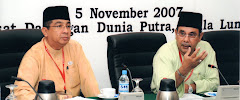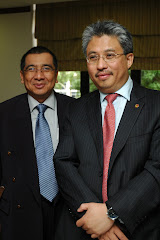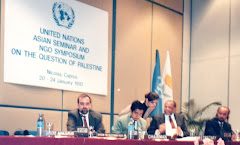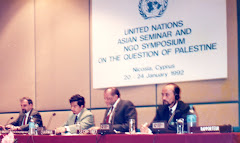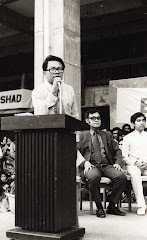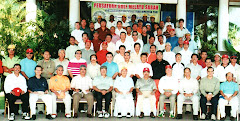Lately the mainstream media is awash with a campaign for Malaysians to be moderate. Led by the English-language media, the campaign received ‘a huge boost’ via a letter of support signed by the '25 eminent Malays', consisting largely of former high-ranking civil servants and diplomats.
On top of demanding a public debate on Shariah law vis-à-vis Federal Constitution, the 25 also aired anxiety on the rising 'bigotry' and 'extremism' which the English-based media tend to associate with, and blame,Malay and Islamic-based groups, such as UMNO, PAS, PERKASA and ISMA.
In the eyes of many self-professed 'Moderate Muslims' who proudly claim to uphold 'liberal' and 'democratic' values, such Malay and Islamic groups are regarded by them to be ‘right-wingers’ – an euphemism for extremists.
"Moderate, Liberal, Democratic, Bigot, Extremist," - these are all loaded terms that need to be unpacked with proper intellectual tools in order to adjudicate their claims justly.
To what extent the claims made by these eminent Malays valid; firstly, by professing themselves to be 'moderate Muslims' and secondly, their views on extremism which they contrasted themselves against?
Since the central focus here is about the religion of Islam, it is best for us to examine the sources from within Islam itself notably the Holy Quran and Prophetic tradition (hadith) to understand how Islam views moderation contra extremism.
Extremism as defined by Prophet Muhammad
Much has been spoken about the meaning of Wasatiyyah, an Arabo-Islamic technical term which often insufficiently rendered into English as 'moderation’.
Moderation as understood in English fails to do justice to the word Wasatiyyah which generally means "avoiding the excesses" in the English worldview.
Wasatiyyah is not only moderation but primarily it means 'to be just'. The proper definition of Wasatiyyah would be: “the middle point between the two extremities of excesses as well as deficiencies which reflects justice and wisdom based on the conditions stipulated in the Holy Quran and Prophetic traditions (hadith)” where justice is defined in Islam as "to put things in its proper places".
Moderation as understood in English fails to do justice to the word Wasatiyyah which generally means "avoiding the excesses" in the English worldview.
Wasatiyyah is not only moderation but primarily it means 'to be just'. The proper definition of Wasatiyyah would be: “the middle point between the two extremities of excesses as well as deficiencies which reflects justice and wisdom based on the conditions stipulated in the Holy Quran and Prophetic traditions (hadith)” where justice is defined in Islam as "to put things in its proper places".
More often than not, the uninformed public regard extremism to be an act that go beyond the limit of an established norm of the majority or religious and moral truth. But this understanding is incomplete in Islamic viewpoint as it only explained the first half of extremism spectrum in Islam, which is the 'excesses' (tafrit/ghuluw). The often missing and forgotten dimension in today’s discourse on the spectrum of extremism in Islam is the part on 'deficiency' (ifrat/naqis).
Prophet Muhammad (peace be upon him) had stated very clearly in one of his hadith the kinds of extremism that will appear within Muslim communities:
"This Knowledge (i.e. Shariah) will be transmitted from every just successor (i.e. scholars of Islam) who will negate the distortions of the deviated, the plagiarism of the people on falsehood and the false interpretations of the ignoramuses”
Scholars of Islam – those who mastered the sources of Islam – have not limit the meaning of extremism to those whom Prophet stated above solely referring to the extremist Muslim militant groups like ISIS, Taliban and suicide bombers.
On the other hand Muslim who placed rationality above and beyond the limit stipulated by the scripture, or regards 'man as measure of all things' are deemed to be part of this ‘deficient’ extremist group within the fold of Islam.
The former has gained international fame due to their violent nature and anti-modern. Islam for them must be understood in rigid, literal and ossified manner. Muslim scholars have no qualm to label them as extremists on the ground of their excesses in fulfilling what they claimed to be God's command which in actual fact they distorted the commands with their own whims and desires.
But the latter form of Muslim extremism is not so easily distinguishable from the normal Muslims and rarely being scrutinized by the mainstream media because the values and principles they uphold are pretty much in tandem with the spirit of this era where secularism and liberal democratic values are regarded to be the apex of modern civilizations, bequeathed by Western colonial masters that once ruled the Muslim polities.
Call a spade, a spade
The mistake made by this group of ‘Moderate Muslim’ is that their proposal, either intentionally and unintentionally – will alter and retrofit Islam according to the mould of
Western modernity; not the other way round as how it usually transpired in the history of Islamic civilizations.
Western modernity; not the other way round as how it usually transpired in the history of Islamic civilizations.
In the past, Muslims appropriated the best values and cultures from other non-Islamic civilisations like Greek and Persian into the fold of Islam without harming its conceptual integrity and cardinal principles.
By adopting everything from the West in toto and uncritical manner, it reflects an extremism of a deficiency-kind because such thinking will definitely dilute the cores of Islam that are already and firmly established within Muslim communities.
It is impossible for Islam to undergo changes or reform just for the sake to be accepted within the fold of modern contemporary zeitgeist like how Christianity has evolved in the West.
The letter penned by the ‘Moderate Muslims’ suggested that Syariah (Islamic life-system) must be scrutinized based on the principles of liberal democracy by further subsuming it under the common law that many Muslims scholars totally disagreed as Syariah must be sovereign as it claims to reflect divine justice, far exalted than man-made positive law.
Such letter drew many criticisms from many Muslim scholars and religious authorities as they regarded the content of the letter that embodies a reformation spirit that has gone off tangent. Instead of strengthening and upholding Syariah, the letter is replete with unsubstantiated claims, laced with skepticism, and prejudice on the status of Syariah law in Malaysia.
In actual truth, this whole discourse of being moderate is very much skewed and champion by marginal, urban Malay figures and personalities who derived their supports from the urban constituencies and ill-informed non-Muslims. They generally cherished Western culture and values and have lost touch with their own intellectual Islamic tradition.
This is a common tragedy in Muslim world today. The failure of the excessive, rigid and ossified Muslims in negotiating their way through the current of modernity is no better than Muslims who are so liberal, and deficient in their understandings of Islam.
Both have compromised the conceptual integrities of Islam and experienced confusion and error in knowledge. They both misunderstood and reduced Islam merely as a collection of injunctions and law that is devoid of moral, intellectual and spiritual cores.
Learned Muslims who understand the centrality and primacy of Syariah know very well such debate and discussions are not meant for laity. As stated in the Holy Qur'an, "only those who are deeply rooted in knowledge (i.e. Syariah)" are able to deal with the intricacies of the subject at hand and they are the Muslim scholars, specifically the Islamic legal philosophers and thinkers (fuqaha').
It is not the proposition of the letter that has invited great suspicions from Malay and Muslims at larger rather the brazen and callous manner it was argued against Syariah that many perceived them to be a clandestine extremism of liberal and deficient kind hidden within the moderation garb.
Make no mistake on the seriousness of Muslims at large in demanding Syariah to be reinstated back to the center of the political system in Muslim-majority countries. In 2013 Pew Research Center survey found out 86% of Muslims in Malaysia favoured in making Syariah as the country’s official law, no longer restricted to family and marital matters.
This undying request still echoes the spirit that was vividly captured by a British educationist, R.J Wilkinson during the colonial period: “There can be no doubt the Muslim Law would have ended by becoming the law of Malaya had not British law stepped in to check it.”
Muslims at large must know that such deficiency is a form of religious liberalism that is condemned in Islam. Like it distant opposite of excesses, it too fails to strike the sweet spot of justice as demanded by the word Wasatiyyah.
*The author is a fellow at Putra Business School, Universiti Putra Malaysia






























